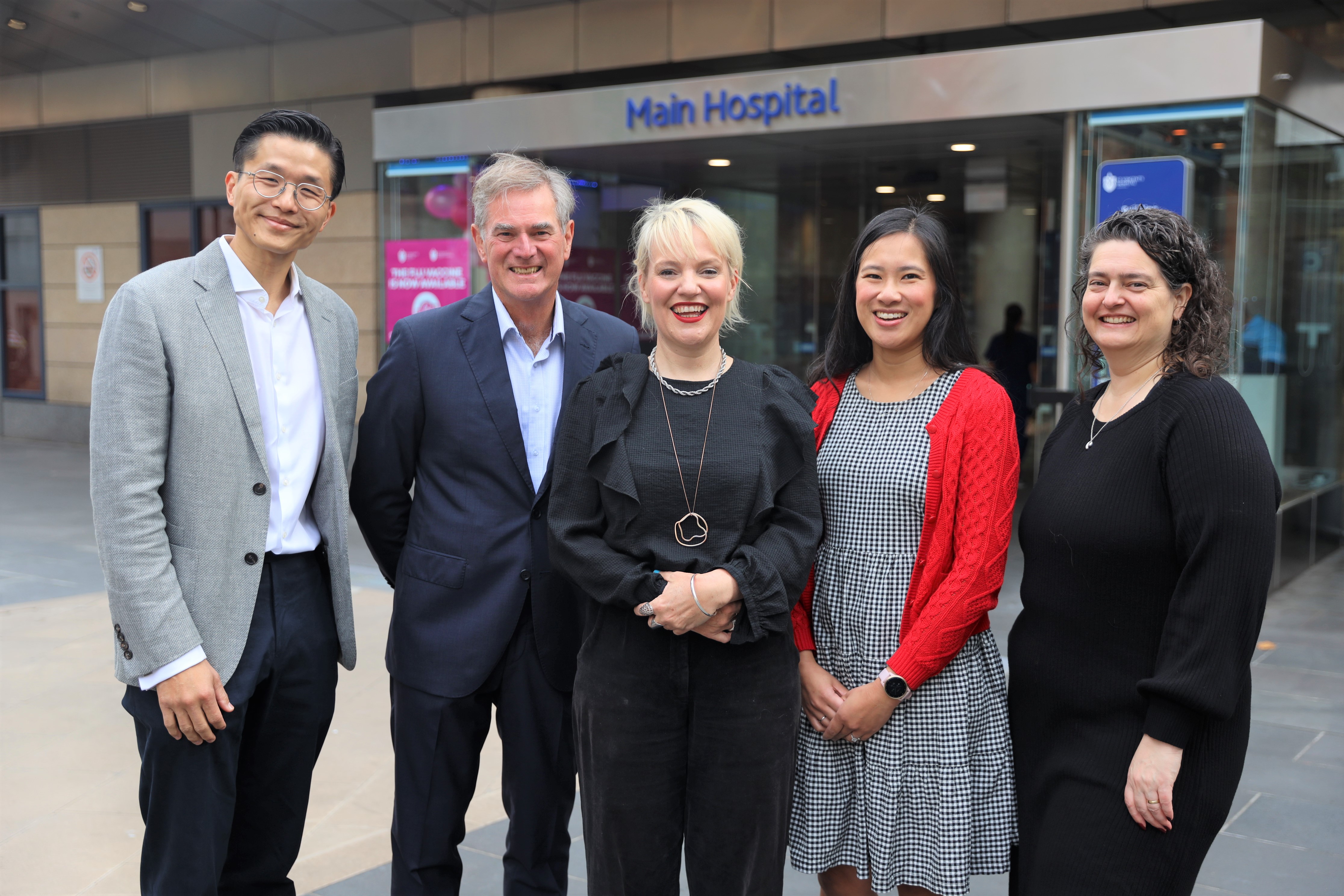Putting the compassion into patient care

Above: Jacinta Parsons pictured with members of her treatment team; (L to R) Associate Professor John Ding, Associate Professor Bill Connell (Head of SVHM’s IBD Clinic), Jacinta Parsons, Tamie Samyue (IBD Nurse Practitioner) and Stephanie Fry (IBD Clinical Nurse Consultant)
Looking back on the daily struggles she has faced as a result of Crohn’s Disease and the many years of living in chronic pain, Jacinta Parsons said one thing that gave her tremendous strength during the tough times was the care she received as a patient at St Vincent’s Hospital Melbourne.
“So much of my life has been spent here, and so much of my life has been shaped here. My connection with St Vincent’s is really deep,” said Jacinta, a writer, radio broadcaster and a former host of ABC Melbourne.
“I have developed long-term relationships with my treatment team – all the specialists and nurses – they saw me as a person, not just another case. It was their simple acts of acknowledgement and understanding that helped reduce the trauma of what was happening to me and supported me to move forward and embrace the person I am today.”
Jacinta was diagnosed with Crohn’s Disease (a type of Inflammatory Bowel Disease) at St Vincent’s when she was 25. She recalled being sick for quite a while beforehand but couldn’t understand why.
“I had been living with excruciating abdominal pain and felt constantly tired. It affected my ability to work, particularly as I began finding it hard to walk and even talk,” said Jacinta, who has been living with Crohn’s Disease for more than two decades now.
Eventually she underwent some medical tests and further investigations at St Vincent’s Hospital Melbourne’s IBD Clinic and was immediately hospitalised.
“There was a great feeling of relief when I was diagnosed. Finally, there were some parameters for what was happening to me, but the double edge of the diagnosis also meant coming to terms with living with chronic illness. It took me quite a few months for all of that to really sink in,” she explained.
Feeling supported and seen

Above: Jacinta Parsons
Jacinta spent several years in and out of hospital, undergoing day procedures and multiple operations, where she was often in hospital for three or four weeks.
“I go back to those times in hospital, and I reflect on the incredible nurses who would come and hold my hand and look kindly at me. It’s the moments when you are at your lowest and feeling incredibly vulnerable, both emotionally and physically and especially at night when you can’t sleep and feeling scared – their acts of kindness provide so much comfort,” said Jacinta.
“I really want to shout-out to the nurses at St Vincent’s. I think nurses play such an important role in helping reduce the trauma of illness as patients. They definitely did this for me.”
Today, Jacinta’s care involves attending regular appointments as an outpatient at the IBD Clinic to help her manage her illness and enable her to safely continue to live her best life. She described her specialist, Associate Professor John Ding, a gastroenterologist at SVHM, as a perfect example of someone who provides the type of patient-centred care that reduces the negative impact a long-term illness can have.
“I have had two children (now aged 20 and 12) since my diagnosis – something I wasn’t sure would happen, but both my pregnancies were carefully managed by the IBD Clinic team,” she said.
“I remember calling a specialist one time who potentially saved one of my pregnancies through advice on managing my Crohn’s while I was pregnant.”
Jacinta said she has always felt seen and supported as a patient at St Vincent’s.
“People who work in the hospital may not realise the impact they are having on patients. But to people like me, who are on the receiving end, it’s this care that made the difference,” she said. “This type of care where your humanity is understood is so important in healthcare – especially for those with chronic illness where your connection with the hospital is a long-term one.
“St Vincent’s has been there for me and is a significant part of my life. It is another place of comfort for me.”